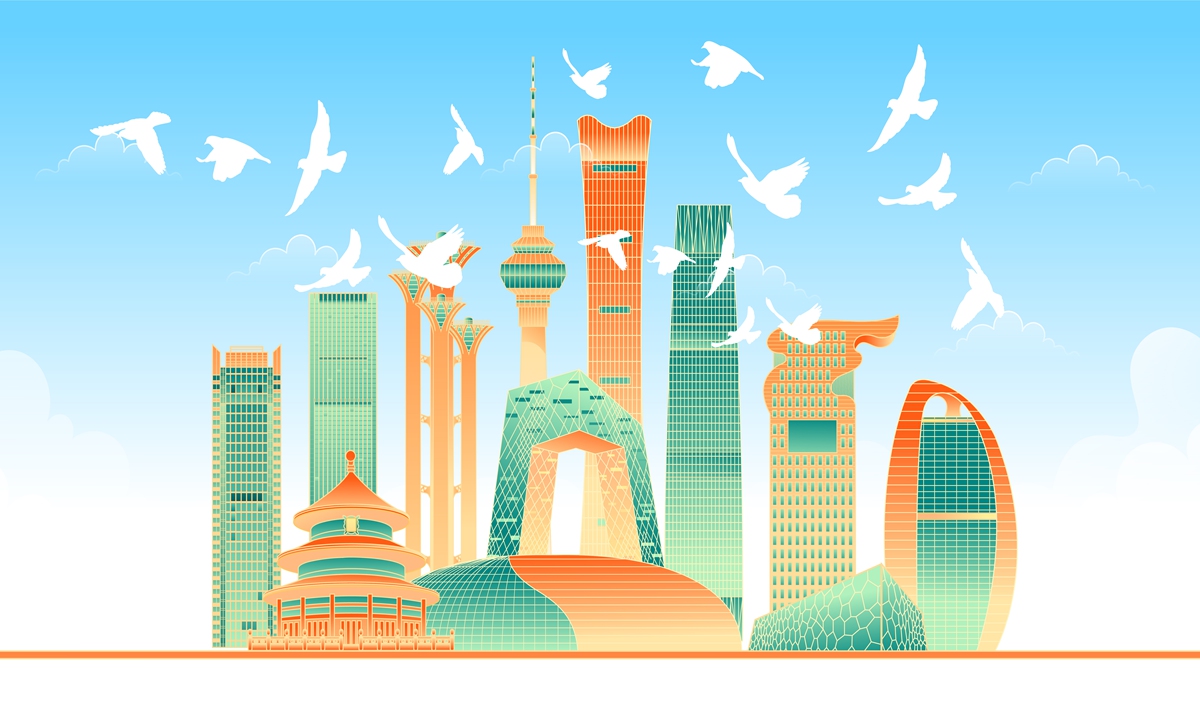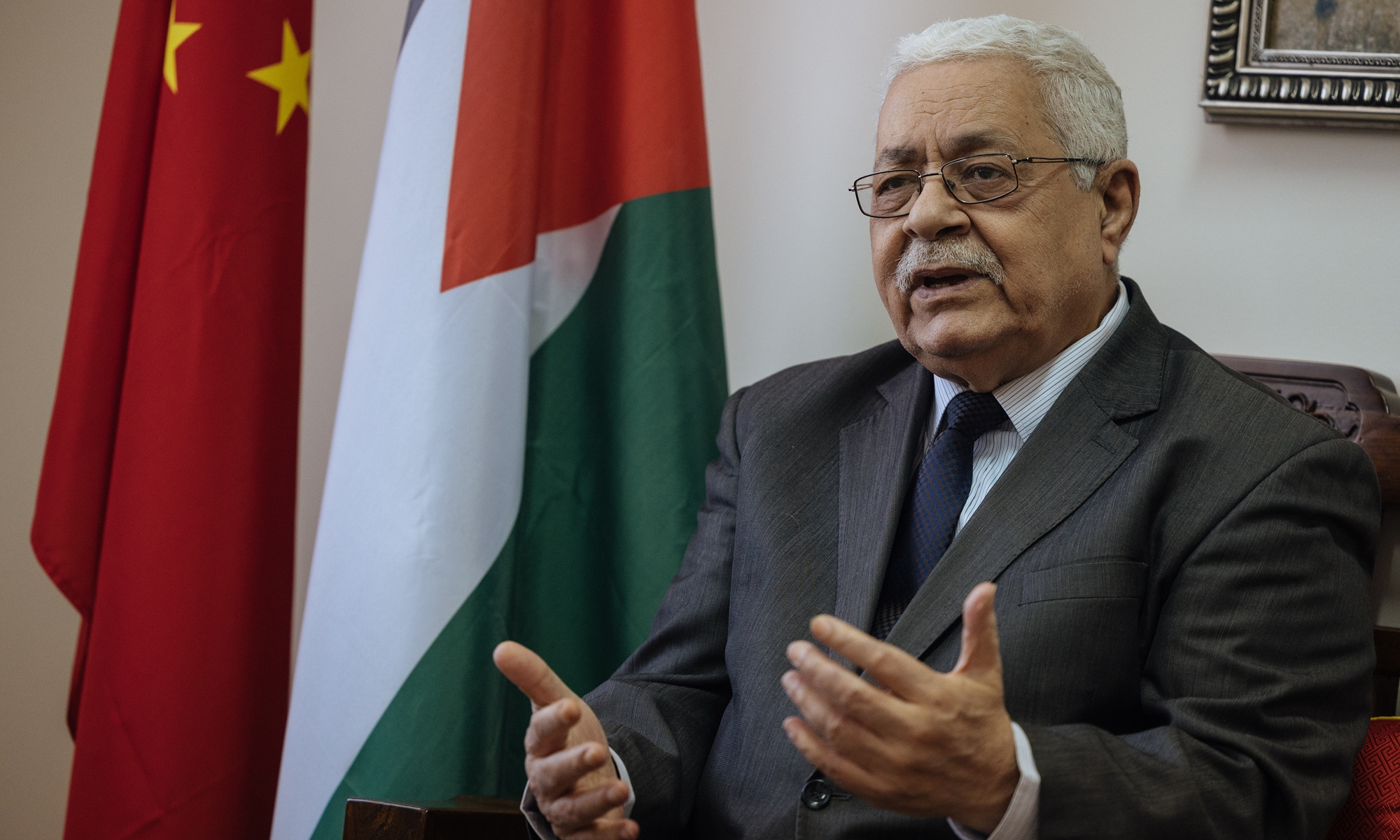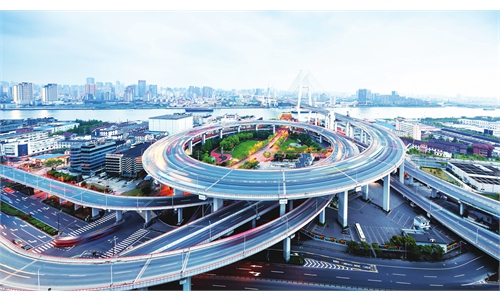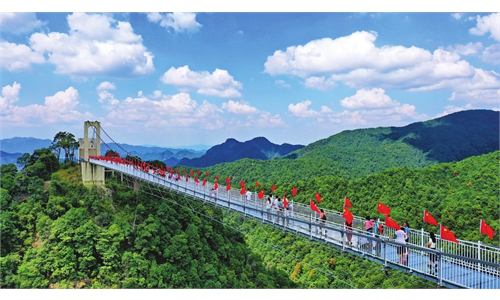China puts itself at the forefront of a proactive foreign policy to be a peace builder, stability provider: Palestinian Ambassador to China

Photo: VCG
Editor's Note:The two sessions, one of China's most important annual political events, are an important window for the outside world to understand China's development achievements, plans, governance philosophy, diplomatic concepts and global initiatives. Through this window, international observers closely watch China's moves and recognize China's development.
"For China, peace and stability are very important in its foreign policy; that is why China is devoted to put its sincere efforts to achieve them throughout the whole world and express its readiness to work with all other relevant actors at the international level," Palestinian Ambassador to China Fariz Mehdawi (Mehdawi), told Global Times (GT) reporter Wang Wenwen in an interview. He said that the Palestinian people are quite happy about "the proactive foreign policy of China putting itself at the forefront to be a peace builder and stability provider."
This is the seventh interview of this series over the two sessions.
GT: Why does China stress so much on the people? How do the two sessions practice the people-centered development philosophy?
Mehdawi: China is ruled by a unique political system, and it is based on the satisfaction of the population at large. The legitimacy of the system comes from the overall satisfaction, endorsement, and approval of the people. During the last few decades, any fair observer would say the vast majority of the Chinese people are happy about what's happening in their country, and they're optimistic about the future. That's really a sign of approval that gives the legitimacy of the system itself and the institutions they are governing.
This is not the case in different countries such as those with a liberal democracy. That's why the emphasis of leadership here is what could please the population at large, and what the people are expecting. The Party is enshrined within the people because it's a huge party, which knows what's happening throughout the system. The Party comes from within the population. They would adjust exactly according to the needs of the people. Many people who are not Chinese don't know how the system works. Actually, there is so much monitoring and evaluation which is happening continuously throughout the population in cities, towns, villages, and the countryside.
After living here in this country for six years, I've been following what's going on in the countryside, when I travel around China. They would say we are not happy about this; we are happy about that. It's very dynamic, a kind of interactive democracy, which reaches from down to the top level of leadership. So, every year, whenever the two sessions are held, those policies would take into consideration the feedback which is coming from the masses. This is quite an experience which doesn't look like in any other place.
GT: In your opinion, what is "people-centered?"
Mehdawi: China has gone a long way in alleviating the living standards of the Chinese people up to 1.4 billion or even more. There is no such other country like China. The last batch of those who were really living under the poverty line as has been defined by the United Nations has just been brought down to zero. So, there is no more extreme poverty in China; this is by itself a huge achievement. Many countries have not been able to achieve this.
But it doesn't mean that the distribution of growth in China was also equal at the same time. So, this is the problem that the government and the Party are intended really to fix - bridging between those who have and those who have not. Because we talk about socialism here. Socialist country should guarantee, I'm not saying equality or obsolete equality, but at least the gap should be reasonable.
There was a need for adjustment. This adjustment is going to be reflected in the economic policies of the country, for example, changing from an export-oriented economy into what we call a dual-circulation policy in which the consumption here is going to be the real generator for the development and for the growth.
These policies are going to be strengthened. It has started already, but I think the line of the new policy is going to adjust to guarantee that every Chinese will have a better level of life and better quality of life, because we are talking here about common prosperity.
So far, I think the government has taken good steps, but more is needed. So mainly what I'm saying is that it will be a mix of continuity as it used to be and new adjustments to increase the level of income of the ordinary. Make sure that nobody is unemployed and also respond to the priorities of the national security of the country in terms of food, for example, sufficiency, and certain needs in the high tech. China is all the time a stable political system that is capable to renew itself from within without endangering the stability of the society, which remains very important for the achievement of sustainable development.

Fariz Mehdawi Photo: Li Hao/GT
GT: How do you evaluate China's role as a peacemaker, like in the Palestinian question and the Ukraine issue?
Mehdawi: The Israeli practices against our population at large are really unprecedented in the terms of their cruelty and aggression, which keep no hope for a peaceful solution. It's very depressing. It shows that the peace process for Palestine seems to be a very tough challenge for us to reach, the Chinese position about the two-state solution, which the whole world is endorsing, is quite genuine.
For China, peace and stability are very important in its foreign policy; that is why China is devoted to putting its sincere efforts to achieve them throughout the whole world and expressing its readiness to work with all other relevant actors at the international level. So, this dynamic foreign policy of China is very important. Now we have seen recently, China has proposed a position paper on the situation in Ukraine, which is very important. No wonder it has received a good positive response and endorsement by many countries around the world.
I hope that China can really make a constructive move in that direction. That depends on the positive response from other players, such as the European Union and by both Russia and Ukraine. China has got balanced relations with both countries and they are well-situated to play its role.
So, we are quite happy about the proactive foreign policy of China putting itself at the forefront to be a peace builder and stability provider.
GT: How do the Global Development Initiative and Global Security Initiative advocated by China reflect the country's diplomatic outlook?
Mehdawi: It is actually a response to the international crisis that we are passing through. We have seen over the last five years how much the whole world politics is in trouble. Although we have got the United Nations system, most of the resolutions and principles have been ignored by some other players. Unfortunately, the global governing system is not working by the book.
We need to realize that we are living in a multipolar system in which no country can really dictate the rules. So, the rules in what we call a world of rules-based order are the ones which had been accepted by the world, not those rules which had been put by some powerful countries to enforce them selectively whenever and wherever it is suitable or favorable to their interests. This is the basic principle of democracy and equality. We need to guarantee that there is a fair and equal globalized governing system, not because it's nice, but because it's necessary.
I think China is advocating that we really need to adjust the global system to ensure that it's multipolar, it's not unipolar. Those countries, which are responsible because they are big and powerful in their economy and their technology, should take care of those who do not have. We're talking about equality within one society, but there is also a lack of equality among the global citizens of the world. There are people who are on the disadvantaged receiving end in Asia, the Middle East, Africa and Latin American countries, where they have got really serious challenges even with affording basic needs in housing, water and education. It is a responsibility for all of us to ensure that humans at large are living in dignity with reasonable equality. We need to fill the gap between those who have and those who have not at the international level, not only at the national level.
I think we need to thank China for initiating those kinds of proposals, which are actually put forward for discussion and debate ideas.
GT: From the Belt and Road Initiative (BRI) to a human community with a shared future, why have these initiatives initiated by China received widespread response from the international community, especially developing countries?
Mehdawi: China is trying to replicate its own experience. If we see how development has happened in China across the last 30 to 40 years, it was by really increasing connectivity. If we check how many thousands of kilometers of roads and railways had been built inside China to connect its west with its east, how many bridges, airports, the connectivity in terms of infrastructure and building of energy had developed China and it was a very successful experience.
When we talk about BRI, this is the same policy that China applied inside its own borders by expanding it into a larger scale, into the neighborhood and to the world, which is bringing a new dynamic to the world economy.
In the beginning, this was a simple thought. But some forces like to see it as a conspiracy for domination or a strategic plan of hegemony. It's not. China discovered that by building projects of infrastructure that connects countries, it turns itself into a partner with those countries instead of being enemies who are only giving back to each other. We are neighbors, and we need to connect with each other. This is a very good recipe for stability, cooperation and peace.
So, it's good for China to share projects, roads and railways, economic cooperation and trade which make neighbors partners and friends work together for mutual benefits. It provides peace among good neighbors and enables them to work with each other far away from hostility and suspicion into partnership and cooperation. You can see the BRI had already helped not only China, but also its neighbors. Central Asia now is connecting East Asia with Europe, becoming not a center of conflict between Europe and Asia, but rather a bridge for cooperation. In this case, both sides are winning. Nobody is losing with this kind of cooperation.
This is very courageous on the part of China to propose and initiate such a major and mega plan. This is the only available plan actually in town - we can't see other initiatives that could generate growth to the whole world economy. I think this is something to be appreciated, and I'm sure many countries have already appreciated and joined the BRI. Recently, the State of Palestine signed the agreement and formally became a member in this initiative. Hopefully, we are going to be a beneficiary. It's not about China. It's a global initiative.



